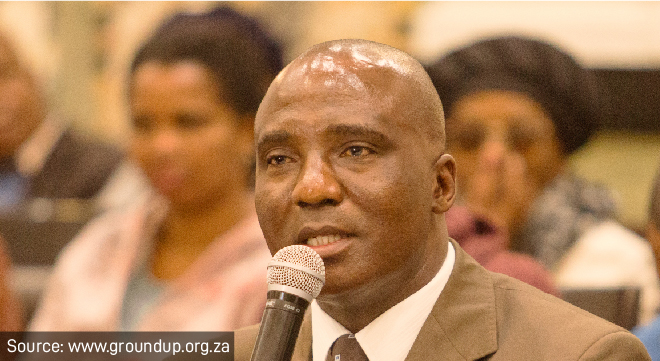The chairperson of the National Assembly’s Standing Committee on Finance (Scof) this week sharply criticised “a section” of the business community for publishing a report suggesting there is an 85% probability that South Africa will be grey-listed next year.
ANC MP Joseph Maswanganyi (pictured) was referring to the research report by Intellidex and commissioned by Business Leadership South Africa.
Read: Research report advises South Africans to prepare for grey-listing
“I am very disappointed that while we are busy processing this bill, [a] certain section of business in South Africa publishes a report which suggests that South Africa has got an 85% probability of being grey-listed. I don’t know in whose interest business is publishing such a negative report. Which methodology have they applied to arrive at this percentage, and why do they do that?” Maswanganyi said at the start of Scof’s meeting on Tuesday.
During the meeting, National Treasury provided its preliminary response to comments by stakeholders on the General Laws (Anti-Money Laundering and Combating Terrorism Financing) Amendment Bill (see below).
He said it was important that business, civil society, labour and Parliament worked together to avoid grey-listing, because grey-listing would have dire consequences for the economy and South Africa’s image internationally.
It was “very disappointing” that people did not come to Parliament and say what the legislature and the government could do to prevent grey-listing, “because if you publish such a report as business, it’s like scoring an own-goal for the country”, Maswanganyi said.
“[…] You are telling the world, […] grey-list us, so why shouldn’t they grey-list you? It is very disappointing for such a constituency to do that.”
He said there were serious challenges to overcome to prevent grey-listing, but they were not insurmountable.
“We are not happy with the report published by business to canvass for South Africa to be grey-listed,” he concluded.
DA MP says committee members should read the report
But the DA’s Dr Dion George said he did not agree with Maswanganyi’s assessment of Intellidex’s report. He said the report was not advocating for grey-listing but setting out the possible consequences of grey-listing, and as such he welcomed it.
In his view, the report did not point fingers, although it could have. “That is our function in Parliament.”
George said he agreed with Maswanganyi that grey-listing was the last thing that anybody wants.
“But the fact of the matter is there’s a big chance we will be grey-listed, and if we are, we’ve got to get off as fast as possible, because our economy will be impacted. And that is how I certainly read that report. I do think that there’s been dithering on this process […], but we can’t dwell on the past.”
George recommended that every Scof member reads the report, and that its authors come to Parliament and talk through it, because “it was very valuable”.
Maswanganyi responded that George’s “interpretation” of the report was welcome.
“We have got a festival of ideas, and we have also got our own interpretation of that report. And, as you suggest, why don’t they come to this platform and make their submissions in the interests of the country?”
Treasury cuts NPOs some slack
Perhaps the most significant concession announced by Treasury during Tuesday’s meeting is that every non-profit organisation (NPO) will not have to register with the Department of Social Development’s NPO Directorate.
There has been an outcry from the non-profit sector over the bill’s amendment to the NPO Act that would have made it compulsory for all non-profits, including associations such as knitting clubs and choirs, to register.
Read: Non-profit organisations caught between a rock and a hard place
Treasury’s proposed amendments to the bill will mean that only organisations that make donations to individuals or organisations domiciled in a foreign country or that provide services outside South Africa will have to register under the NPO Act.
However, Treasury rejected a plea by the JSE for listed companies to be exempt from the requirement to register their beneficial owners. However, Treasury said it would adjust the bill to make the requirements “reasonably implementable” by listed companies.
The JSE told the committee last week that the bill’s requirements relating to listed companies’ beneficial ownership information were impractical.
Read: Amendments could result in companies moving their primary listing, says JSE
Last week, Scof extended the deadline for public comment to 25 October. On Tuesday, Maswanganyi said the committee will process the bill clause by clause on 1 November.



